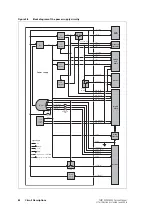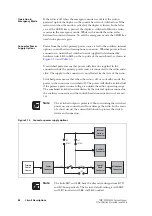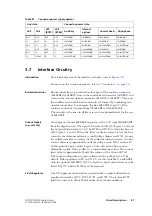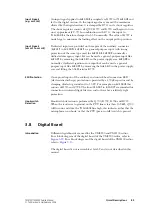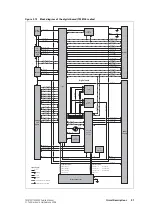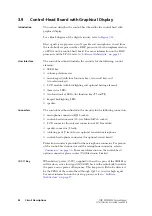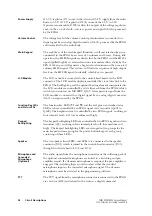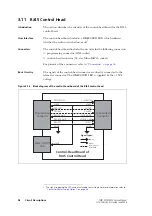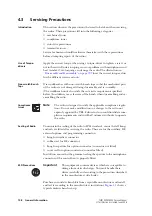
94
Circuit Descriptions
TM8100/TM8200 Service Manual
© Tait Electronics Limited
June 2006
Power Supply
A 3.3V regulator (U1) converts the switched 13.8V supply from the radio
body to 3.3V. A 1.5V regulator (U203) converts the 3.3V to 1.5V.
A power-sense module (U202) verifies the outputs of the voltage regulators
and—in the case of a fault—creates a power reset signal which is processed
by the FPGA.
Volume Control
The voltage level of the volume control potentiometer is converted to a
digital signal by an analog/digital converter (U601), processed by the FPGA
and transmitted to the radio body.
Main Keypad
The eight keys of the main keypad (function, scroll and selection keys) are
connected to the FPGA by an array of 3 columns and 3 rows. During idle
operation, the
KEY ROW
signals are driven low by the FPGA and the
KEY COL
signals (pulled high by an external resistor) are monitored for activity by the
FPGA. A key-press will generate a high-to-low transition on the associated
column
KEY COL
signal. This, in turn, will initiate a sequence of high output
levels on the
KEY ROW
signals to identify which key was pressed.
LCD Module
The LCD module is connected to the control-head board via the LCD
connector. The LCD module display is controlled by a serial data link to the
FPGA. The backlighting and the optional heating element incorporated in
the LCD module are controlled by a data line each from the FPGA, which
switch two transistors on MOSFET Q102. A temperature signal from the
LCD module is converted to a digital signal by an analog/digital converter
(U601) and processed by the FPGA.
Function Key LEDs
and Status LEDs
The function key LEDs (
F1
and
F4
) and the red, green and amber status
LEDs each are controlled by an FPGA signal and a transistor (Q604 to
Q608). The brightness level is controlled by two FPGA signals, resulting in
four intensity levels (off, low, medium and high).
Keypad
Backlighting
The keypad backlighting LEDs are controlled by two FPGA signals and two
transistors (Q2), resulting in four intensity levels (off, low, medium and
high). The keypad backlighting LEDs are arranged in two groups for the
main keypad and one group for the power button keypad, each group
consisting of three LEDs.
Speaker
The two speaker lines (SPK+ and SPK–) are connected to the speaker
connector (J104) which is joined to the control-head connector (J103)
through two ferrite beads (L105 and L106).
Microphone and
Concealed
Microphone
(Optional)
The audio signals from the microphone connector or the soldering pads of
the optional concealed microphone are routed to a switching and pre-
amplifier circuit. If a dynamic microphone is required, the pre-amplifier is
engaged. The switching logic is used to select either the standard
microphone input or the concealed microphone signal. The dynamic
microphone must be activated in the programming software.
PTT
The PTT signal from the microphone connector is connected to the FPGA
via a resistor (R25) and relayed to the radio as a digital command.
Summary of Contents for TM8235
Page 1: ...TM8100 mobiles TM8200 mobiles Service Manual MMA 00005 04 Issue 4 June 2006...
Page 10: ...10 TM8100 TM8200 Service Manual Tait Electronics Limited June 2006...
Page 62: ...62 Description TM8100 TM8200 Service Manual Tait Electronics Limited June 2006...
Page 148: ...148 Disassembly and Reassembly TM8100 TM8200 Service Manual Tait Electronics Limited June 2006...
Page 162: ...162 Servicing Procedures TM8100 TM8200 Service Manual Tait Electronics Limited June 2006...
Page 178: ...178 Interface Fault Finding TM8100 TM8200 Service Manual Tait Electronics Limited June 2006...
Page 258: ...258 Receiver Fault Finding TM8100 TM8200 Service Manual Tait Electronics Limited June 2006...
Page 446: ...446 Spare Parts TM8100 TM8200 Service Manual Tait Electronics Limited June 2006...



